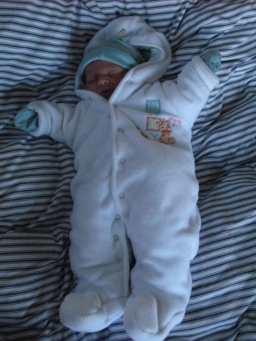Of all the stabbings I have experienced in my life, the first stabbing is the one that I remember most fondly. Primarily because I don't remember it at all, but also because (unlike the other times) I was not the person who was stabbed.
The stabbing occurred when I was six weeks old. My mother had taken me to visit my Glaswegian grandparents. I was the first New Zealander to whom they were related, and they viewed my arrival with considerable interest. In honour of my visit, my grandmother decided to buy a new rug for their front hall.
Unfortunately for her, my grandfather was going through one of his difficult patches. As early as 1926 he had developed the habit of shouting "get a proper job" at policemen who happened to cross his field of vision. His latest crusade was the abolition of central government. He had already written an impassioned letter on this subject to his local member of parliament, and was awaiting a response.
Naturally enough, he viewed the purchase of a rug as a dangerous distraction to his revolutionary activities. My grandmother, however, had not survived the wartime air-raids on Glasgow for nothing. She was resolute in her insistence on a new rug. And so, reluctantly, my grandfather accompanied her on a shopping expedition.
At the department store, the selection process led to a certain amount of tension. My grandmother was irresistibly drawn to a fancy Persian-style carpet. My grandfather preferred another rug, which -- by complete co-incidence -- was only quarter of the price.
In the end, my grandmother's preference prevailed. When they arrived home and laid out the rug in the front hall, my grandfather conceded that it looked very nice. "And so it should -- for the amount of money it's cost us," he added.
The next day I made my triumphant arrival, and was no doubt praised by all as a thoroughly bonny six-week-old (although, to be perfectly truthful, descriptions of my loveliness are strangely absent from the accounts I've heard of these events).
By late afternoon, the initial excitement of my visit had begun to wane. My uncle -- who had recently returned from art school in London -- retired to his bedroom to play classical music. My grandfather was in the sitting room watching Crown Court. He could occasionally be heard shouting at the television set: "Of course he's innocent!" and "The police framed him, you dimwits!" My mother and grandmother were having tea and scones in the front room. I was sleeping peacefully in my bassinet.
The scene was set for a stabbing.
As she later testified in court, my mother answered the doorbell on the assumption that it was my uncle. Being artistically inclined, he'd been known to leave the house via his bedroom window, only to discover -- upon his return -- that the wind had blown it shut and he'd been locked out.
Expecting her brother, my mother was therefore surprised to discover a stranger at the front door. She was even more surprised when the stranger groaned and toppled forward onto the new rug in the front hall -- cinematically revealing a knife hilt sticking out of his back.
It speaks volumes for my grandfather's propensity to be difficult that both my mother and grandmother's first thoughts were not for the victim -- or even the rug -- but rather for the terrible fuss that my grandfather was bound to cause. My grandmother had visions of police inspectors arriving on the property, an altercation breaking out, and my grandfather being removed in handcuffs while shouting quotations from the Magna Carta and the Bill of Rights 1689. My mother, who possesses a rather bloodthirsty imagination, even considered the possibility of a police shoot-out.
Simultaneously, they were both seized with the notion of concealing the stabbing victim from my grandfather. While my grandmother whispered words of consolation ("Try not to groan so loudly, dear, we're just going to move you,") my mother went to enlist my uncle's assistance in dragging the victim along the hall to the front room -- a location where he'd be less visible in the event that grandfather should wander through the house.
My uncle was deeply engrossed in Part 2 of Stravinsky's Le Sacre du Printemps when he became aware of my mother's presence. She stood palely at the door -- much in the manner of Lady Anne's ghost from Richard III -- gesticulating silently that he should keep quiet and follow her.
Anticipating a glimpse of a beatifically sleeping nephew, my uncle was unprepared to be led to the body of a stabbed man lying in the hall. Naturally enough, he leapt to the conclusion that either my mother or grandmother was responsible. "My God, what made you do it?" he exclaimed.
Hissing at him to be quiet, my mother and grandmother outlined the situation, and requested his help in relocating the victim. To his credit, my uncle point-blank refused to have any part in such a thing -- claiming that he'd been taught in art school never to move a stabbed person.
Sensing that my uncle would not be swayed on the matter, my grandmother hastily adopted an alternative stratagem. She retrieved a tea-towel from the linen cupboard, and draped it over the protruding knife hilt -- in the hope, she later told me, that my grandfather would thus be persuaded that the stabbing victim was actually a meter-reader. I've always wondered how she imagined this would play out.
By this time, the stabbing victim -- who had been quietly bleeding over the new rug -- had begun to babble about calling an ambulance. However, as my grandmother pointed out, this raised another thorny problem. The telephone was located in the kitchen, and the kitchen adjoined the sitting room. Any call to the emergency services would therefore be fully audible to my grandfather.
A prolonged silence greeted her observation -- eventually broken by my uncle, who cleared his throat thoughtfully before raising the obvious points:
- Clearly, a criminally-inclined person had inserted the knife into the stabbing victim.
- This unknown criminal -- who might accurately be described as a 'knife-wielding maniac' -- might, quite plausibly, still be in the vicinity.
And consequently, if my grandmother were about to suggest that a member of the household (for example, him) should be sent outside to borrow the neighbours' telephone, then he (my uncle) would like to register his strongest objections.
My uncle went on to explain that he wasn't concerned so much for himself, but rather for the staff of the emergency services, who -- he strongly felt -- shouldn't be burdened with more than one stabbing victim at a time.
To be fair, whenever my mother and grandmother recounted the subsequent events, their praise of my uncle was both effusive and unstinting. My mother likened his ascent of the neighbours' fence to a performance by an Olympic high-jumper. My grandmother declared that his athleticism put her in mind of a gazelle. At any rate, shortly thereafter, my uncle appeared at the neighbour's window -- waving to indicate that he'd managed to telephone the police.
As it turned out, it was fortunate that my grandmother had sent him to Mrs Chandler -- an elderly woman who had been their neighbour for many years. The neighbours on the other side were newly arrived, which meant that my grandmother had been disinclined to borrow their telephone. In fact, she hadn't even spoken to them yet, although she'd formed the impression that they were rather odd: possibly English.
And so everyone settled down to wait for the emergency services. My grandmother gave succour to the stabbing victim as he drifted in and out of consciousness. My mother watched out the window for police activity, and waved occasionally to my uncle at Mrs Chandler's house. I continued to slumber in my bassinet.
Time passed. In the sitting room, Crown Court ended, and an American comedy programme began. My mother and grandmother could hear my grandfather getting restless, and warming up to his usual speech about having to pay a television licence fee to watch bloody rubbish. Fearful that he would seek out an audience for his oratory -- as he almost always did -- my mother was dispatched to head him off.
It was not a moment too soon. Grandfather had already made it as far as the kitchen; and my mother was only able to lure him back to the sitting room by the cunning device of asking him to read to his new grandson.
As she knew, my grandfather was inordinately proud of his talent for reading aloud, and even liked to assume different voices for different characters (albeit all of them with Glaswegian accents). My mother told him, quite truthfully, that she'd heard that reading to a sleeping baby was helpful for its mental development.
With this in mind, my grandfather chose Orwell's Homage to Catalonia as his text. By the time he'd reached the chapter about trench warfare in Huesca, my mother was beginning to worry. Surely it shouldn't have taken the police quite this long to arrive? Gradually, but inexorably, her mind began to dwell upon my uncle's description of a "knife-wielding maniac".
At the time, his words had struck her as fanciful. After all, the maniac was no longer in possession of a knife; she'd clearly observed it sticking out of the stabbing victim. But then the obvious thought struck her -- viz. that the maniac might be the owner of two knives.
At this point, my mother began to wonder if she'd remembered to lock the front door. Her thoughts turned to the possibility of a maniac stealing into the house, and how easy it would be to silently overpower my grandmother. In fact, even now, the maniac could be crouching in the next room, about to burst forth and stab them all.
It was quite understandable, therefore, that when the sitting room door suddenly opened, my mother inadvertently screamed: "Help! It's the murderer!" In actual fact, it was only my uncle and grandmother. Fortunately my mother's cry roused me to wakefulness, and in my ensuing screaming binge, her little outburst was forgotten. This was my small -- but, I like to think, crucial -- contribution to proceedings.
My uncle and grandmother affected an air of nonchalance, but they had been enjoying themselves no end in my mother's absence. The street had been cordoned off by armed police, and they had witnessed the gratifying spectacle of their new neighbour surrendering himself at gunpoint. Subsequently, the stabbing victim had been stretchered from the front hall, and a policeman had taken their statements. "I've seldom had such an interesting afternoon," said my grandmother later.
At the time, of course, the matter could not be discussed -- although my grandmother did manage to quickly summarize the situation to my mother in the kitchen. It was only when my grandfather went to collect the newspaper that they realized their concealment had not been flawless.
"Here, where's our new rug gone?" he called from the front hall.
As it happened, the police had taken the rug as evidence for bloodstains. Given the day's events, my grandmother can be forgiven for simply saying the first thing that came into her head. "I took it into the dry-cleaners," she replied.
There followed a long and convoluted exchange as to why my grandmother would want to take a brand-new rug to the dry-cleaners -- made even more complicated by the fact that my grandfather (it transpired) had long held a theory that all dry-cleaners are fascists, and you shouldn't give them your business.
In the end, the police never did give back the new rug, and my grandmother had to say that the dry-cleaners had ruined it. With typical unpredictability, however, this news delighted my grandfather, since it fully confirmed his anti-dry-cleaner theories.
So, in a funny way, it all ended happily (except for the new neighbour who was sentenced to prison). My grandfather went to his grave without ever learning of the stabbing; my grandmother was compensated for the disappearance of the rug; my uncle discovered a hitherto undetected talent for lying, and eventually became an award-winning actor.
I wish I could report that the stabbing victim married the wife of the new neighbour; but alas, their relationship -- although very intimate -- did not survive the court case.



